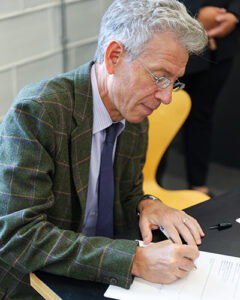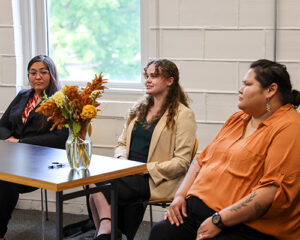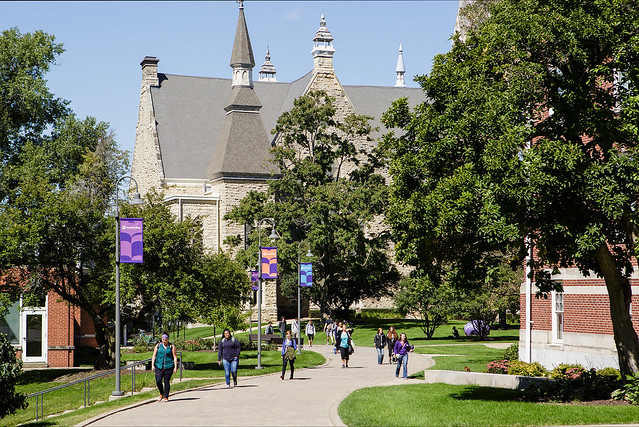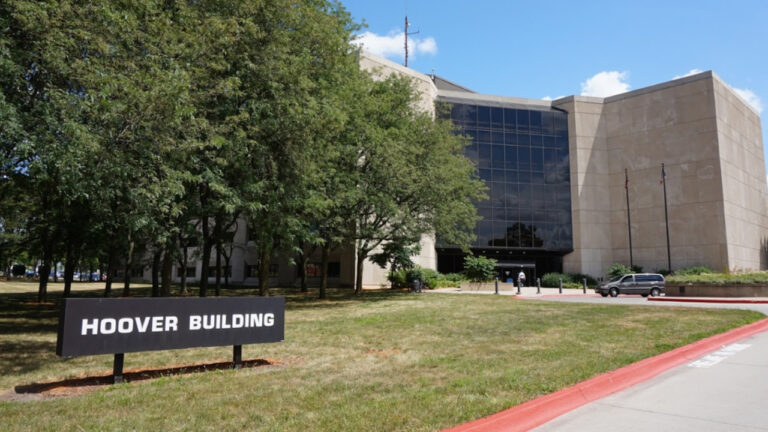Cornell College has returned a Mississippian Native American funerary statue to the Muscogee (Creek) Nation after the artifact spent 125 years in the college’s collection.

Cornell College President Jonathan Brand signed documents Sept. 30 transferring ownership of the 21-inch-tall, 56.5-pound statue to tribal representatives during a ceremony in McWethy Hall.
“This is a very special moment for our people,” said Savannah Waters, tribal historic preservation officer for the Muscogee (Creek) Nation and one of three representatives who traveled to Cornell to attend the event. “Thank you for creating this moment. Thank you for letting us come get this and take it back home where it’s supposed to be.”
According to a post on the college’s website, the statue’s origins were discovered in spring 2025 through research by Natalie Zenk, a 2025 Cornell graduate who examined the piece for her archaeology and art history senior thesis. The artifact was donated to a Cornell archaeology and geology professor in 1900 by A.J. Powers, who purchased it in 1896.

CREDIT CORNELL COLLEGE
Ms. Zenk found a photograph of the statue in a book written in the 1970s and again in a research paper published by a Cornell student in the 1950s that identified the statue as coming from Georgia. She contacted Georgia’s state archaeologist and traced the statue’s origins to the Mississippian culture, an ancient Native American society that thrived across the southeastern United States.
“It felt like I was solving a mystery, and I was getting to delve into figuring out where this came from and the history of it,” said Ms. Zenk, who now works as an archaeologist at Prairie Archaeology and Research in Illinois.
Cornell’s collection was reviewed in 1994 for objects falling under the Native American Graves Protection and Repatriation Act of 1990, but the statue was incorrectly determined to be ineligible. When Ms. Zenk reexamined the piece, she learned it had been removed from a burial site in Georgia. She worked with Christina Penn-Goetsch, professor of art history, to initiate the return process.

Muscogee (Creek) Nation representatives said archaeologists excavated burial sites in the 1920s, ’30s and ’40s, sending items from ancestral burial mounds around the world.
“I’m thankful for you all, being here today, allowing this opportunity to come and help us make something that happened in the past — that’s none of our faults — make it right,” secretary of culture and humanities for the Muscogee (Creek) Nation RaeLynn Butler said during the ceremony. “No one’s grave deserves to be desecrated like that. Our goal is to make sure that everything goes back to rest the way that it should be. We don’t want our ancestors on shelves anymore.”
The Muscogee (Creek) Nation is working with hundreds of institutions to gather items and remains from ancestral burial grounds. The artifacts will be reburied near the Etowah Mounds State Historic Site in Bartow County, Georgia.
“It’s a way to help our people heal, a way to learn about our history, to honor our heritage,” Ms. Butler said. “Our people have had to overcome so much, and most of our lives have just been able to survive. As we can reclaim these items and bring them back, it helps us reconnect to our homeland, but also to try to have a role and help fix what happened in the past. You know, we had no say in those excavations. We didn’t even want to leave that land, you know. And so for all of these injustices to happen for hundreds of generations, and today, we all can be part of making that wrong, right. That’s what motivates me to continue this type of work.”
Out of respect for a request from the Muscogee (Creek) Nation, Cornell is not releasing photographs of the statue.








